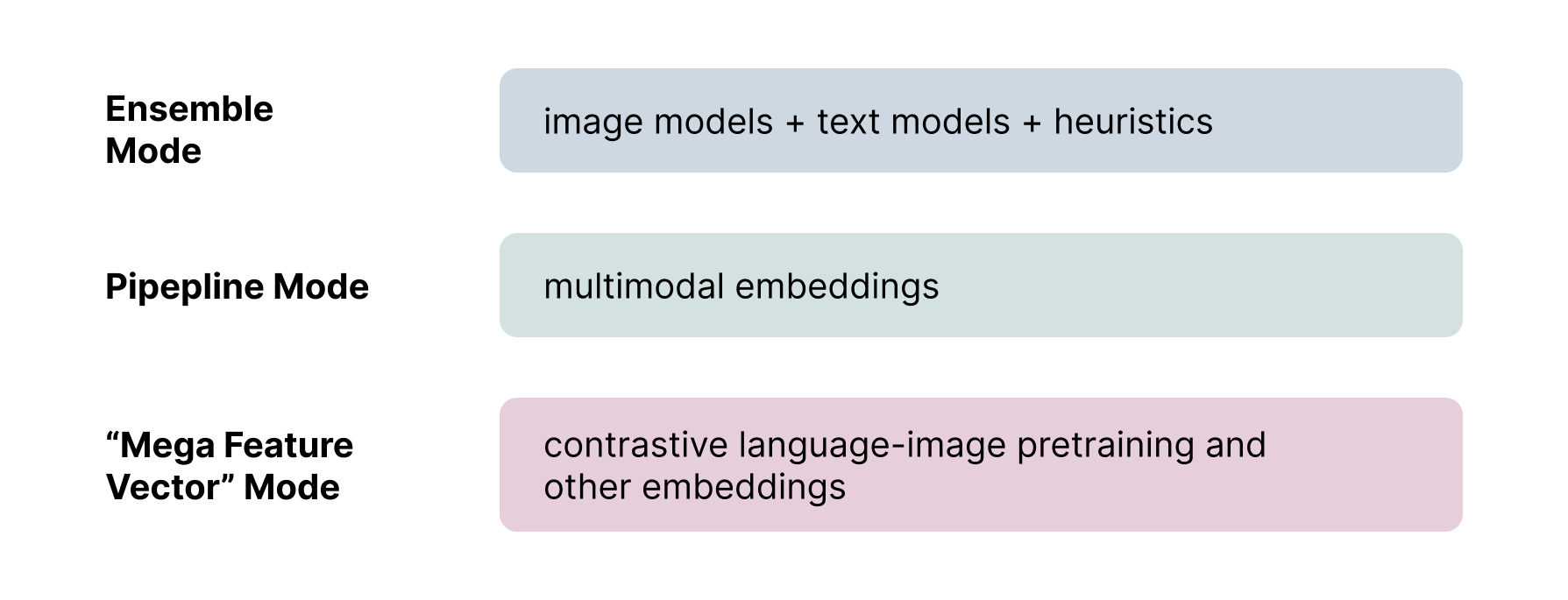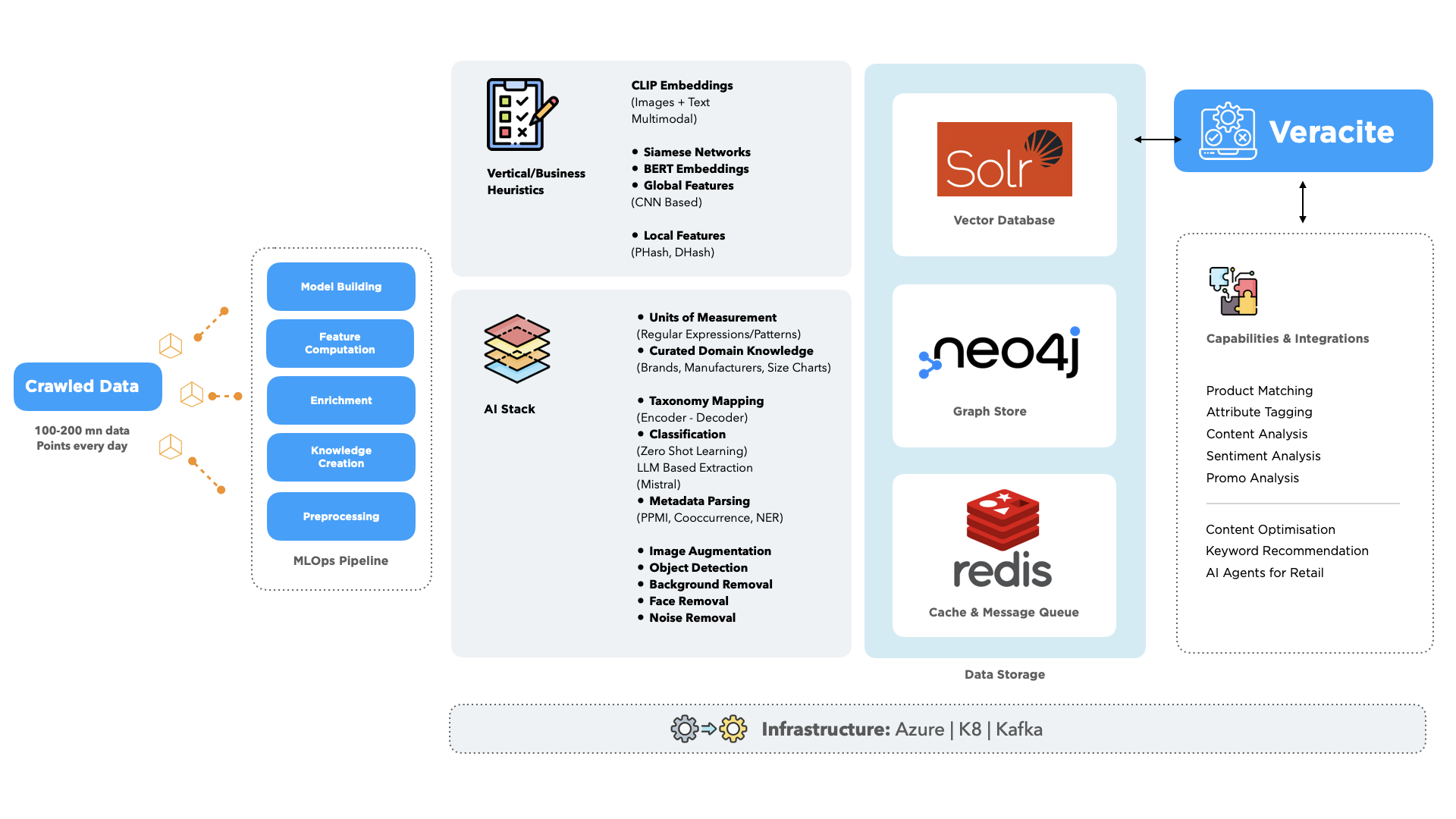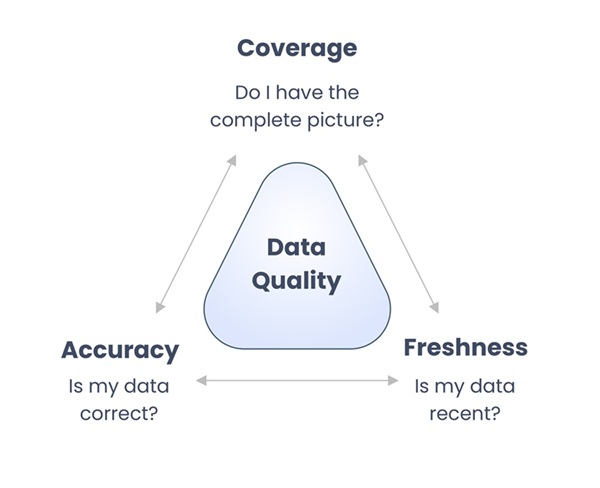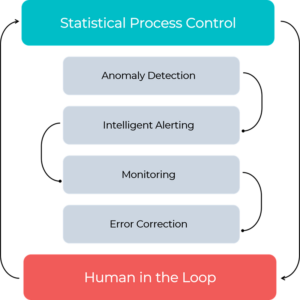Managing the endlessly growing competitive data from across your eCommerce landscape can feel like pushing a boulder uphill. The sheer volume can be overwhelming, and ensuring that data meets standards of high accuracy and quality, and the insights are actionable is a constant challenge.
This article explores the challenges eCommerce companies face in having sustained access to high-quality competitive data and how AI-driven solutions like DataWeave empower brands and retailers with reliable, comprehensive, and timely market intelligence.
The Data Quality Challenge for Retailers and Brands
Brands and retailers make innumerable daily business decisions relying on accurate competitive and market data. Pricing changes, catalog expansion, development of new products, and where to go to market are just a few. However, these decisions are only as good as the insights derived from the data. If the data is made up of inaccurate or low-quality inputs, the outputs will also be low-quality.
Managing eCommerce data at scale gets more complex every year. There are more market entrants, retailers, and copy-cats trying to sell similar or knock-off products. There are millions of SKUs from thousands of retailers in multiple markets. Not only that, the data is constantly changing. Amazon may add a new subcategory definition in an existing space, or Staples might decide to branch out into a new industry like “snack foods for the office”, an established brand might introduce new sizing options in their apparel, or shrinkflation might decrease the size of a product.
Given this, it is imperative that conventional data collection and validation methods need to be revised. Teams that rely on spreadsheets and manual auditing processes can’t keep up with the scale and speed of change. An algorithm that once could match products easily needs to be updated when trends, categories, or terminology change.
With SKU proliferation, visually matching product images against the competition becomes impossible. Knowing where to look for comprehensive data becomes impossible with so many new sellers in the market. Luckily, technology has advanced to a place where manual intervention isn’t the main course of action.
Advanced AI capabilities, like DataWeave’s, tackle these challenges to help gather, categorize, and extract insights that drive impactful business decisions. It performs the millions of actions that your team can’t accomplish with greater accuracy and in near real-time.
Improving the Accuracy of Product Matching

DataWeave’s product matching capabilities rely on an ensemble of text and image-based models with built-in loss functions to determine confidence levels in all insights. These loss functions measure precision and recall. They help in determining how accurate – both in terms of correctness and completeness – the results are so the system can learn and improve over time. The solution’s built-in scoring function provides a confidence metric that brands and retailers can rely on.
The product matching engine is configurable based on the type of products that we are matching. It uses a “pipelined mode” that first focuses on recall or coverage by maximizing the search space for viable candidates, followed by mechanisms to improve the precision.
How ‘Embeddings’ Enhance Scoring
Embeddings are like digital fingerprints. They are dense vector representations that capture the essence of a product in a way that makes it easy to identify similar products. With embeddings, we can codify a more nuanced understanding of the varied relationships between different products. Techniques used to create good embeddings are generic and flexible and work well across product categories. This makes it easier to find similarities across products even with complex terminology, attributes, and semantics.
These along with advanced scoring mechanisms used across DataWeave’s eCommerce offerings provide the foundation for:
- Semantic Analysis: Embeddings identify subtle patterns and meanings in text and image data to better align with business contexts.
- Multimodal Integration: A comprehensive representation of each SKU is created by incorporating embeddings from both text (product descriptions) and images or videos (product visuals)
- Anomaly Detection: AI models leverage embeddings to identify outliers and inconsistencies to improve the overall score accuracy.

Vector Databases for Enhanced Accuracy
Vector databases play a central role in DataWeave’s AI ecosystem. These databases help with better storage, retrieval, and scoring of embeddings and serve to power real-time applications such as Verification. This process helps pinpoint the closest matches for products, attributes, or categories with the help of similarity algorithms. It can even operate when there is incomplete or noisy data. After identification, the system prioritizes data that exhibits high semantic alignment so that all recommendations are high-quality and relevant.
Evolution of Embeddings and Scoring: A Multimodal Perspective
Product listings undergo daily visual and text changes. DataWeave takes a multimodal approach in its AI to ensure that any content shown on a listing is accounted for, including visuals, videos, contextual signals, and text. DataWeave is continually evolving its embedding and scoring models to align with industry advancements and always works within an up-to-date context.
DataWeave’s AI framework can:
- Handle Diverse Data Types: The framework captures a holistic view of the digital shelf by integrating insights from multiple sources.
- Improve Matching Precision: Sophisticated scoring methods refine the accuracy of matches so that brands and retailers can trust the competitive intelligence.
- Scale Across Markets: Additional, expansive datasets are easy for DataWeave’s capabilities, meaning brands and retailers can scale across markets without pausing.
Quantified Improvements: Model Accuracy and Stats
- Since we deployed LLMs and CLIP Embeddings, Product Matching accuracy improved by > 15% from the previous baseline numbers in categories such as Home Improvement, Fashion, and CPG.
- High precision in certain categories such as Electronics and Fashion. Upwards of 85%.
- Close to 90% of matches are auto-processed (auto-verified or auto-rejected).
- Attribute tagging accuracy > 75% and significant improvement for the top 5 categories.
Business Use Case: Multimodal Matching for Price Leadership
For example, if you’re a retailer selling consumer electronics, you probably want to maintain your price leadership across your key markets during peak times like Black Friday Cyber Monday. Doing so is a challenge, as all your competitors are changing prices several times a day to steal your sales. To get ahead of them, this retailer could use DataWeave’s multimodal embedding-based scoring framework to:
- Detect Discrepancies: Isolate SKUs with price mismatches with your competition and take action before revenue is lost.
- Optimize Coverage: Establish a process to capture complete data across the competition so you can avoid knowledge gaps.
- Enable Timely Decisions: Address the ‘low-hanging fruit’ by prioritizing products that need pricing adjustments based on confidence scores on high-impact products. Leverage confidence metrics to prioritize pricing adjustments for high-impact products.
This approach helps retailers stay competitive even as eCommerce evolves around us. By acting fast on complete and reliable data, they can earn and sustain their competitive advantage.
DataWeave’s AI-Driven Data Quality Framework
Let’s look at how our AI can gather the most comprehensive data and output the highest-quality insights. Our framework evaluates three critical dimensions:
- Accuracy: “Is my data correct?” – Ensuring reliable product matches and attribute tracking
- Coverage: “Do I have the complete picture?” – Maintaining comprehensive market visibility
- Freshness: “Is my data recent?” – Guaranteeing timely and current market insights

Scoring Data Quality
To maintain the highest levels of data quality, we rely on a robust scoring mechanism across our solutions. Every dataset that is evaluated is done so based on several key parameters. These can include things like accuracy, consistency, timeliness, and completeness of data. Scores are dynamically updated as new data flows in so that insights can be acted upon.
- Accuracy: Compare gathered data with multiple trusted sources to reduce discrepancies.
- Consistency: Detect and rectify variations or contradictions across the data with regular audits.
- Timeliness: Scoring emphasizes data recency, especially for fast-changing markets like eCommerce.
- Completeness: Ensure all essential data points are included and gaps in coverage are highlighted by analysis.
Apart from this, we also leverage an evolved quality check framework:

Statistical Process Control
DataWeave implements a sophisticated system of statistical process control that includes:
- Anomaly Detection: Using advanced statistical techniques to identify and flag outlier data, particularly for price and stock variations
- Intelligent Alerting: Automated system for notifying stakeholders of significant deviations
- Continuous Monitoring: Real-time tracking of data patterns and trends
- Error Correction: Systematic approach to addressing and rectifying data discrepancies
Transparent Quality Assurance
The platform provides complete visibility into data quality through:
- Comprehensive Data Transparency & Statistics Dashboard: Offering detailed insights into match performance and data freshness
- Match Distribution Analysis: Tracking both exact and similar matches across retailers and locations as required
- Product Tracking Metrics: Visibility into the number of products being monitored
- Autonomous Audit Mechanisms: Giving customers access to cached product pages for transparent, on-demand verification
Human-in-the-Loop Validation (Véracité)
DataWeave’s Véracité system combines AI capabilities with human expertise to ensure unmatched accuracy:
- Expert Validation: Product category specialists who understand industry-specific similarity criteria
- Continuous Learning: AI models that evolve through ongoing expert feedback
- Adaptive Matching: Recognition that similarity criteria can vary by category and change over time
- Detailed Documentation: Comprehensive reasoning for product match decisions
Together, these elements create a robust framework that delivers accurate, complete, and relevant product data for competitive intelligence. The system’s combination of automated monitoring, statistical validation, and human expertise ensures businesses can make decisions based on reliable, high-quality data.
In Conclusion
DataWeave’s AI-driven approach to data quality and coverage empowers retailers and brands to navigate the complexities of eCommerce with confidence. By leveraging advanced techniques such as multimodal embeddings, vector databases, and advanced scoring functions, businesses can ensure accurate, comprehensive, and timely competitive intelligence. These capabilities enable them to optimize pricing, improve product visibility, and stay ahead in an ever-evolving market. As AI continues to refine product matching and data validation processes, brands can rely on DataWeave’s technology to eliminate inefficiencies and drive smarter, more profitable decisions.
The evolution of AI in competitive intelligence is not just about automation—it’s about precision, scalability, and adaptability. DataWeave’s commitment to high data quality standards, supported by statistical process controls, transparent validation mechanisms, and human-in-the-loop expertise, ensures that insights remain actionable and trustworthy. In a digital landscape where data accuracy directly impacts profitability, investing in AI-powered solutions like DataWeave’s is not just an advantage—it’s a necessity for sustained eCommerce success.
To learn more, reach out to us today or email us at contact@dataweave.com.
Book a Demo
Login
For accounts configured with Google ID, use Google login on top.
For accounts using SSO Services, use the button marked "Single Sign-on".





